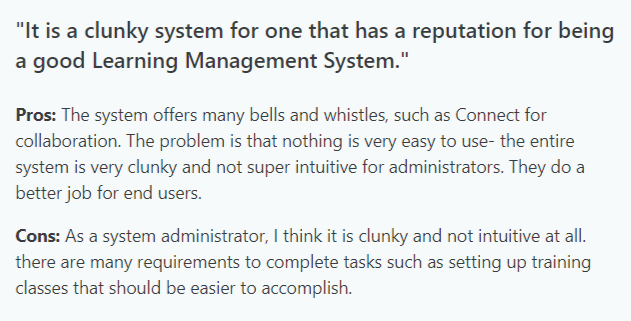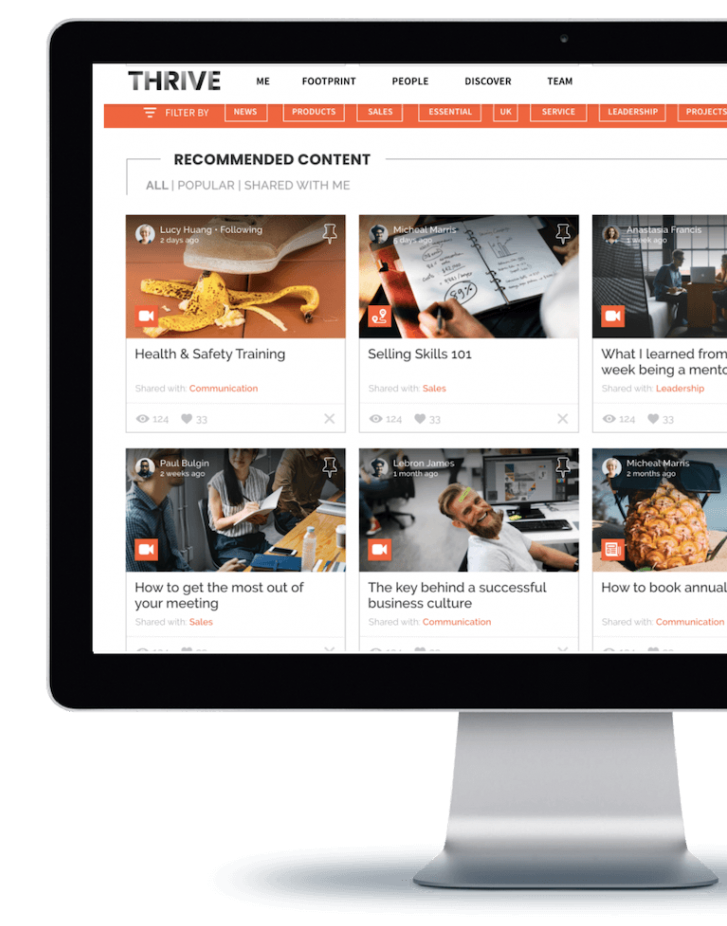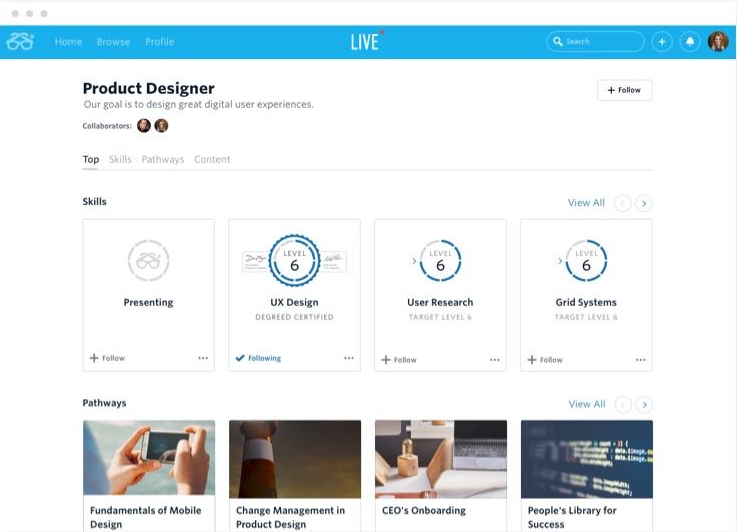Nobody puts Cornerstone in the corner! Wait, that’s not completely right. If you’re here, then you might be ready to review alternatives to that particular LMS, or you’re looking at it, and it’s not quite convincing you.
We’ll talk you through some pros and cons to the platform, before doing the same for seven alternatives to Cornerstone.
What’s the deal with Cornerstone?
Cornerstone’s goal is to help you create a modern learning experience from compliance training to self-driven development. Check out their website, and it’s got all the usual hallmarks you’d expect, talking about personalising learning, helping people find resources anywhere, and gaining detailed insights that help you understand people’s development better.

Pros
Well, as you’d imagine, the ability to report and track compliance is a highlight for some users, while others appreciate the extent of integrations and customisations of this learning management system. The depth of courses and content is something users like too, with options for personalisation ticking plenty of boxes.
Cons
“Trying to figure out exactly how to do what you want to do is not easy” is an interesting quote from a reviewer, insinuating that the platform is not particularly easy to use, and the instructional help videos didn’t ease that issue. A lot of people echoed that sentiment, explaining that understanding how to use the platform was time-consuming, or that a lack of materials made it difficult to figure out how it all works and how to get the most from it.

Some of the other issues include the number of steps taken to create courses, which some indicated slowed them down. Others flagged quality of certifications, ability to edit groups and overwhelming situations when it came to the extent of reporting. Finally, there were some that implied they found inconsistencies across areas of the platform that make it trickier to use. Once you take all that into account, it’s easier to understand why people start their search for a Cornerstone alternative.

If you got here, then you’ve probably got a pretty good idea of what a learning management system or platform is all about. And that means we’re not going to list every single feature or labour points as we present these alternatives. Instead, we’ll talk you through pros and cons for each Cornerstone alternative, all based on genuine user reviews from across the internet.
You can’t teach an old dog new tricks, and that’s why it pays to be one of the younger pups in the world of learning solutions! We’re more interested in building something the learner of today wants than chasing our tail to hang onto the old-school ways of the LMS.
Ticking a box that says somebody has completed training isn’t everything, measuring the skills people developed along the way is more interesting! That way should be filled with meeting people at their point of need, integrating with the apps they already work in, personalised content recommendations, social learning, and knowledge sharing.
Pros
1. Find the information you need, when you need it, everywhere you already work.
When you’re using the tech and tools you rely on every day, you shouldn’t have to head out of them the moment you need to find knowledge. Putting it simply, that’s disruptive to your productivity levels and workflow.
HowNow is one front door for all your scattered resources, meaning all knowledge can be found in one place. We integrate with the apps and tools your team knows and loves, meaning that knowledge becomes available everywhere you are.
Meet our Microsoft Teams integration for yourself in the video below. When knowledge is sent through messages, you can save them directly as Nuggets in HowNow. Likewise, you can share content directly within the app itself too. We also integrate with Slack and plenty of other tools. Oh, and we’ve got an app for all of you that love mobile learning!
What’s your usual reaction when you need to find some information? Of course, you turn to Google. In fact, there are more than 3.5 billion daily searches. That’s a habit you can try to break or work with…
We decided to go with people’s existing flow, to create a user friendly experience that touches on natural learning habits. Which is why our Browser Extension surfaces relevant content from your knowledge base as you search in Google.
How impactful this can be shouldn’t be overlooked. On average, we spend 25% of our time at work trying to find information, but creating one central point for knowledge has been shown to cut that by up to 35%. Lastly, this is how learners like to learn – 49% prefer to find information at their point of need.
2. Social learning and knowledge sharing for all
A traditional LMS model works a little like this: A few select people determine the learning content, that travels from the top-down, and that’s really about it. Sadly, that misses out on all the skills, talent, and experiences of your subject matter experts. This means social learning, knowledge sharing, and breaking knowledge out of silos just doesn’t happen.
Presenting HowNow Nuggets, giving people power to capture and share resources and knowledge with colleagues in no time at all. Goodbye silos, hello social learning! 20% of what we learn at work occurs through social experiences, so it just makes good sense!
3. Identify and close your skill gaps
A big part of having the skills to pay the bills is understanding which skills people have, which they need and that chasm between the two. That’s your skill gap, and it’s what we’re more interested in.
HowNow gives you the power to use self- and peer-review to automate skills to job roles. This helps you benchmark your current skills against the in-demand talents, alongside our analysis of more than half a million live job roles.

Once you’ve identified the skills gaps (if you need more help with this, consider a formal learning needs analysis), the next step has to be closing them. HowNow empowers you to create personalised pathways for your people’s learning, while also providing them with tools that encourage self-driven learning.
4. Content recommendations based on your behaviour and interests
There’s always a temptation to compare learning platforms with Netflix, with those in-demand resources at your fingertips. The difference? Netflix wants you to stick around, asking you if you’re still watching to draw you back in or auto playing the next episode. We want to help you find the information you need fast and in formats that let you understand and put it into practice just as rapidly.
We use AI to send you content that relates to your behaviour, goals and interests. The more you use HowNow, the more we understand you and the better those recommendations get.

The image above is what you can expect to find in HowNow. You’ll spot Channels on the left-hand side, where you can subscribe to the topics you’re interested in and find knowledge on your terms.
5. We’re driving performance and development across 10,000+ teams at forward-thinking companies.
Here are just some of the companies that we’re helping to onboard, upskill and enable their people: Gymshark, Infinity Works, Investec, Telefonica, Telenor, Deutsche Bank and plenty more.
Take HowNow for a spin and book your free trial today!
Cons
We’re going to be pretty shameless here and do the classic trick of turning a con into a pro, but at least we’re honest about it. So, we’ve not been around as some of the alternatives on this list. But that means we’re still growing, evolving, and listening to the people that use our platform every day.
We’re not set in our ways like a typical learning management system, we’ll always listen to your feedback and encourage you to help up shape the HowNow of tomorrow, today. And that’s why we’d love to be your LMS or Cornerstone alternative.

Pros
Reading the reviews, Lessonly seems a very user-friendly platform, with tools like drag and drop to add media into your lessons. A theme that’s found in how people talk about reporting, as it’s simple to understand data around resources, courses, learning, and groups.
Self-testing tools were also highly-praised, with learners able to determine how much they’ve learned from Flip and Reveal Cards, practice their pitches, and lots more.
Cons

Source: Software Advice
The power of search can only be achieved when there’s an intuitive function for searching. Something reviewers seemed to hint was lacking in Lessonly, which could impact its effectiveness as a knowledge base. There were others who highlighted a struggle to find and flag content they’d like to re-read later – if only there was a way to do that…
If you’re looking for lots of customisation, look away now. Branding being limited, not having a great choice for fonts and a similar feel across courses were other concerns. When you’ve got a lot of content, you want to it look different, engaging and appealing, and yet “Lessonly lessons have to fit a strict format/style guide.”

Pros
People love platforms that are easy to use and understand, and that’s something Docebo seems to offer. Create dashboards easily for admins, tap into the user-friendly drag and drop functionality to shape learner pages, and let the platform automatically tag your content. Through Artificial Intelligence, it can connect those resources with the appropriate people. A Q&A function is a nice touch for social learners too but as the review below indicates, you could have better options out there.
Cons

Source: Capterra
Bugs on new releases aren’t a new concept, but there’s a problem when you can spot it as a common theme across reviews. Sure, they get fixed pretty quickly, but they add a level of frustration in a lot of cases. When it came to custom reporting, people were left a little underwhelmed too, while others weren’t particularly praising of the integration capabilities.

Source: Capterra

Pros
As we write this comparison, there are currently 130 courses available on Thrive. For some, that’s plenty, but others have found it to be that aspect of the LXP a little limited.
There’s lots of off-the-shelf e-learning modules but reviewers didn’t find them varied enough to prevent a feeling of familiarity. With microlearning at the heart of what Thrive offers, they want to cut out the unnecessary and focus on critical information. But, as you’ll see in the cons, some were left wanting more.
It’s also worth highlighting that the platform encourages people to learn socially and create their own content while using AI to recommend relevant resources in a user-friendly fashion.
Cons

Source: Capterra
Let’s revisit microlearning. There’s always a need for balance, a desire to make information succinct but not leaving people feeling like there should be more. For some, Thrive’s courses covered the basics well but they really needed more resources to build upon those principles. Other users flagged that tailoring the courses based on their brand wasn’t achievable and some said adding in the content types that they preferred wasn’t always possible. Namely, the quizzes and tests, which help you establish, retain and build on those core ideas.

Source: Capterra

Source: Capterra

Pros
Let’s get you in the Looop, where easy-to-use seems to fill the reviews for this learning management system. The ability to create content simply is there, sending it out is easy and that means you don’t need a PHD in Looop to start using it quickly. Speaking of getting up to speed, you can learn anywhere with their mobile app and its integrations help you find resources in more places. Lastly, their Campaigns feature lets you automate communications and the sending of resources.
Cons
People highlight what they dislike about Looop in a nice way, ‘if I had to pick one thing’ and that kind of caveat. However, they’re things you should still know about, including: re-ordering courses not being that easy, as was the case with seeing all resources in a workspace. Others craved more insights, some wanted less samey content and there were reviews that flagged improved event features and manager dashboards.

Pros
Freedom, the key for a lot of reviewers. They were positive about the freedom for brand customisations, course editing, and a user-friendly drag and drop functionality. Absorb LMS offers a library of pre-built courses, enabling you to get going from the first time you log in. Measuring progress is made capable through their built-in quizzes and tests, while an eCommerce function caters to those selling courses.
Cons

Source: Capterra
Reporting functions left some people feeling underwhelmed, with one adding that “the reporting capabilities leaves a lot to be desired”. When you’re exporting and running reports for courses that include subcategories, you may come into some issues, according to reviewers. Similarly, others flagged frustrations with the limitations of assessment tools.
If you look at the review above, the issues of transitions from a platform that Absorb LMS acquired doesn’t give the impression of it being easy to use. Which is something supported by the one below.

Source: Capterra

Pros
There are reportedly more than 200,000 resources from a total of 1,000 providers in Degreed, which are much easier to navigate as a result of strong search and filter functionality. It’s not all about learning from those external sources, Degreed gives you visibility into your peers’ learning and offers a place to discuss content and progress with them. There’s also the possibility to bookmark content as you read it and tap into books and videos to drive informal learning.
Cons
As you might expect, such a huge amount of content was an overwhelming prospect for some learners. Others cited that the interface wasn’t particularly user friendly, which didn’t help. It also highlights why so many people search for AI-based learning platforms to receive relevant content.

Source: G2
We’ve seen reporting becoming a common frustration in this post and it’s no surprise to see it here. Some bemoaned needing to be a collaborator in order to get full visibility and others wanted it to be clearer what they’d shared.
Meanwhile, some highlighted they found it tricky to add external content, possibly because of a lack of clarity or instruction on how to make the most out of the platform. Lastly, an overwhelming news feed was an issue for some, who felt a little bombarded by content.
Honestly, we don’t know yet… because we haven’t spoken with you. So, with one last nod to our old friend drag and drop, why don’t you drag your mouse to this link, and drop us a message so that we can chat about your learning needs!
%20(1).webp)